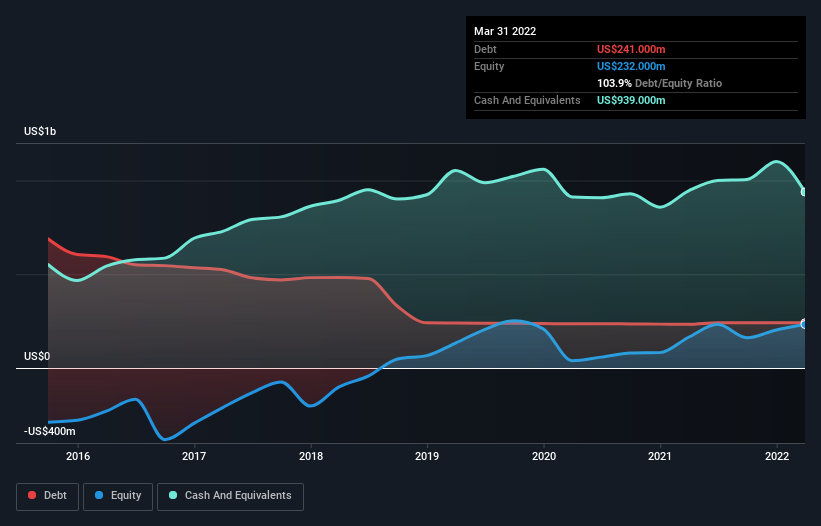
David Iben put it well when he said, 'Volatility is not a risk we care about. What we care about is avoiding the permanent loss of capital.' When we think about how risky a company is, we always like to look at its use of debt, since debt overload can lead to ruin. We note that Indivior PLC (LON:INDV) does have debt on its balance sheet. But is this debt a concern to shareholders?
Why Does Debt Bring Risk?
Debt is a tool to help businesses grow, but if a business is incapable of paying off its lenders, then it exists at their mercy. Part and parcel of capitalism is the process of 'creative destruction' where failed businesses are mercilessly liquidated by their bankers. While that is not too common, we often do see indebted companies permanently diluting shareholders because lenders force them to raise capital at a distressed price. Of course, plenty of companies use debt to fund growth, without any negative consequences. The first thing to do when considering how much debt a business uses is to look at its cash and debt together.
View our latest analysis for Indivior
What Is Indivior's Debt?
The chart below, which you can click on for greater detail, shows that Indivior had US$241.0m in debt in March 2022; about the same as the year before. However, it does have US$939.0m in cash offsetting this, leading to net cash of US$698.0m.

A Look At Indivior's Liabilities
We can see from the most recent balance sheet that Indivior had liabilities of US$728.0m falling due within a year, and liabilities of US$764.0m due beyond that. On the other hand, it had cash of US$939.0m and US$208.0m worth of receivables due within a year. So its liabilities outweigh the sum of its cash and (near-term) receivables by US$345.0m.
Since publicly traded Indivior shares are worth a total of US$2.63b, it seems unlikely that this level of liabilities would be a major threat. Having said that, it's clear that we should continue to monitor its balance sheet, lest it change for the worse. While it does have liabilities worth noting, Indivior also has more cash than debt, so we're pretty confident it can manage its debt safely.
On top of that, Indivior grew its EBIT by 39% over the last twelve months, and that growth will make it easier to handle its debt. The balance sheet is clearly the area to focus on when you are analysing debt. But it is future earnings, more than anything, that will determine Indivior's ability to maintain a healthy balance sheet going forward. So if you want to see what the professionals think, you might find this free report on analyst profit forecasts to be interesting.
Finally, while the tax-man may adore accounting profits, lenders only accept cold hard cash. Indivior may have net cash on the balance sheet, but it is still interesting to look at how well the business converts its earnings before interest and tax (EBIT) to free cash flow, because that will influence both its need for, and its capacity to manage debt. Over the last three years, Indivior reported free cash flow worth 19% of its EBIT, which is really quite low. For us, cash conversion that low sparks a little paranoia about is ability to extinguish debt.
Summing Up
While Indivior does have more liabilities than liquid assets, it also has net cash of US$698.0m. And we liked the look of last year's 39% year-on-year EBIT growth. So we are not troubled with Indivior's debt use. Of course, we wouldn't say no to the extra confidence that we'd gain if we knew that Indivior insiders have been buying shares: if you're on the same wavelength, you can find out if insiders are buying by clicking this link.
If, after all that, you're more interested in a fast growing company with a rock-solid balance sheet, then check out our list of net cash growth stocks without delay.
New: AI Stock Screener & Alerts
Our new AI Stock Screener scans the market every day to uncover opportunities.
• Dividend Powerhouses (3%+ Yield)
• Undervalued Small Caps with Insider Buying
• High growth Tech and AI Companies
Or build your own from over 50 metrics.
Have feedback on this article? Concerned about the content? Get in touch with us directly. Alternatively, email editorial-team (at) simplywallst.com.
This article by Simply Wall St is general in nature. We provide commentary based on historical data and analyst forecasts only using an unbiased methodology and our articles are not intended to be financial advice. It does not constitute a recommendation to buy or sell any stock, and does not take account of your objectives, or your financial situation. We aim to bring you long-term focused analysis driven by fundamental data. Note that our analysis may not factor in the latest price-sensitive company announcements or qualitative material. Simply Wall St has no position in any stocks mentioned.
About LSE:INDV
Indivior
Engages in the development, manufacture, and sale of buprenorphine-based prescription drugs for the treatment of opioid dependence and co-occurring disorders in the United States, the United Kingdom, and internationally.
Very undervalued with reasonable growth potential.


